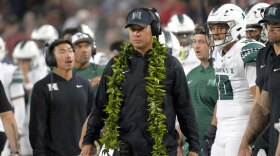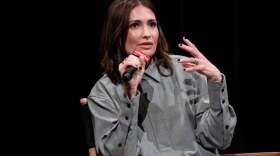STEVE INSKEEP, HOST:
The Columbus Day federal holiday is no day off for the impeachment inquiry. House investigators expect to hear from Fiona Hill, who's lawyer says she is testifying under subpoena. She's a former top aide on the National Security Council staff. She gave advice on Russia and Ukraine. And investigators want to know what insight she has about the president's long-running effort to have a political rival investigated in Ukraine. She left the White House just before the president made his phone call to Ukraine's president in which he brought up Joe Biden.
NPR national security correspondent David Welna has been learning Hill's background. Hi there, David.
DAVID WELNA, BYLINE: Hi Steve.
INSKEEP: Who is she?
WELNA: Well, Fiona Hill was born the daughter of a coal miner in northern England, and she went on to become a top scholar of Russia at Harvard and later at the Brookings Institution. She also served as an intelligence official under both Presidents George W. Bush and Barack Obama.
And notably, unlike Trump, Hill has been quite critical of the reign of President Vladimir Putin. In fact, the week after Trump took office, she told a gathering at Harvard that Russia's meddling in the election that brought him to power was, as she put it, an affront to our national security. And she expressed sympathy for the woman who she said was the object of that meddling, Hillary Clinton.
(SOUNDBITE OF ARCHIVED RECORDING)
FIONA HILL: No matter what your position on Hillary Clinton, she's a former first lady, a former senator, and she was running for public office as a legitimate candidate in a legitimate election, no matter how dirty and contentious this election was.
INSKEEP: Unusual person for the president to bring on board then, given that he has been so scornful of the idea that Russia interfered, the fact that Russia interfered in the presidential election.
WELNA: That's right. Hill was actually recruited to the National Security Council by Trump's first short-lived national security adviser, General Michael Flynn, and by K.T. McFarland from Fox News, who at the time was another top NSC official. But both of them had already been booted off the NSC by the time she got there. Some of Hill's fellow academics were sort of baffled by her decision to work for Trump, who mistook her for a simple note-taker at her first NSC meeting with him.
Michael O'Hanlon is a senior fellow at the Brookings Institution, and he's known Hill for many years. He says he was happy that she took that job.
MICHAEL O'HANLON: Whether you like Trump's politics or not - and I don't really know if she does; I'm skeptical - but this is not going to be an easy environment. So I was grateful, frankly, that somebody I knew and respected so much would try to help out.
WELNA: And O'Hanlon says Hill remained at that job longer than expected because she was repeatedly asked to stay on until she resigned in mid-July, the week before Trump made his now infamous phone call to Ukrainian President Volodymyr Zelenskiy.
INSKEEP: OK. well, here's a question - did she resign because of this unusual approach to Ukraine, the effort by the president's personal lawyer, Rudy Giuliani, over a course of many months, to find political dirt there leading up to that phone call just before she - or just after she left?
WELNA: Well, Steve, you know, that does not appear to be the case. Friends of hers say she was simply worn out. But it was also clear to some of them that her loyalty to Trump was constantly being questioned at the White House. One of those friends I talked with is Jill Dougherty, a fellow at the Woodrow Wilson Center.
JILL DOUGHERTY: They probably did not trust her because she was not part of the campaign or considered kind of an insider. But Fiona was always very discreet. I never heard that she said anything out of school about the administration or even about her work.
INSKEEP: Although I imagine House investigators would like her to be a little less discreet today.
WELNA: That's very true. And because she no longer works for this administration, she's sort of a free agent. There do not appear to be any legal constraints on her appearing before this inquiry. Another Russia expert who knows her well is Georgetown University's Angela Stent, and she says this is Hill's chance to explain just how there was a kind of shadow policymaking process at the White House when it came to Ukraine.
ANGELA STENT: She will certainly explain that the channel that was apparently opened by Ambassador Sondland and Rudy Giuliani, these were things that were going on outside of the purview of the National Security Council.
WELNA: And Stent says Hill's main aim while she was on the NSC was to stay out of the limelight and make sure, as she put it, that worse things don't happen - won't happen when it comes to Russia and Ukraine.
INSKEEP: OK. David, thanks so much for the update. I really appreciate it.
WELNA: You're welcome, Steve.
INSKEEP: That's NPR national security correspondent David Welna talking with us on this morning that we expect testimony from Fiona Hill, former National Security Council aide. Transcript provided by NPR, Copyright NPR.




